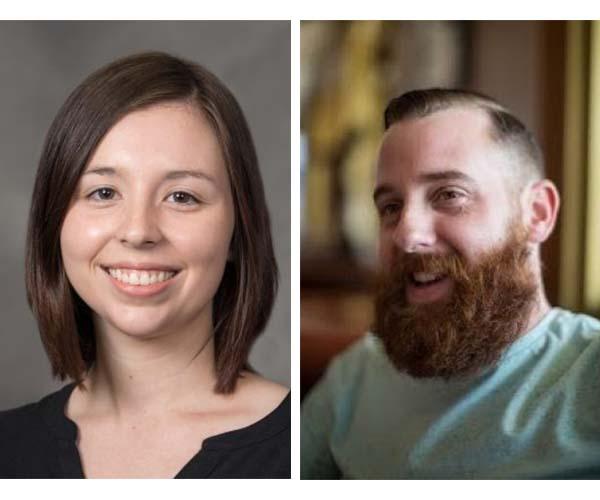
Friday, December 10, 2021
4:00-5:30 PM
Virtual
Linguistics graduate students Justin Craft and Danielle Burgess will present their research.
Danielle Burgess:
Investigating the NegFirst Bias in Learning and Communication
ABSTRACT
In response to the apparent tendency for standard negation markers to appear in preverbal position or to "gravitate leftward" across the world's languages, Horn (1989: 452) postulated a "NegFirst principle". Tendencies for negation to appear early in the sentence have been observed by scholars working in typology, language contact, and language acquisition. However, it remains uncertain if it is necessary to postulate and motivate an independent NegFirst preference, or whether the observed tendencies can broadly be explained by other cognitive and linguistic biases which may play a role in basic constituent order patterns, grammaticalization, and language acquisition. In the current study, I use an Artificial Language Learning paradigm to test the existence of a behavioral bias consistent with NegFirst in the behavior of English speakers, and incorporate a dyadic director-matcher task in order to investigate a hypothesis that the NegFirst principle is driven by communicative factors. This study contributes to a growing body of research which aims to corroborate typological tendencies with behavioral evidence at the individual level. In this talk, I will share preliminary results which suggest that English-speaking learners do show behavior consistent with a NegFirst bias, and discuss plans to extend this research to Japanese speakers in the future.
Justin Craft:
The Effect of Listener Experience and Social Expectation on Illusory Percepts
ABSTRACT
Perceptual recalibration research has been central in demonstrating that listeners readily adapt to accented speech as listeners gain experience with accented speakers. Likewise, the sociophonetic literature has demonstrated that listener expectations and experience established through visual or contextual means also appears to drive listener percepts and inferentially aid in efforts to resolve socially conditioned phonetic ambiguities. In this talk, I'll present preliminary results from one of my dissertation experiments that utilizes McGurk stimuli to probe whether these expectational and recalibratory effects persist in illusory percepts. By breaking the audio-visual integration characteristic of typical speech processing, the use of illusory stimuli targets whether the percepts listeners experience, when stripped of socially meaningful acoustic cues, still show evidence of sociophonetic knowledge that otherwise reflects the variation found in congruent veridical audio-visual signals in the world.
If there is anything we can do to make this event accessible to you, please contact lingadmin@umich.edu. Please be aware that advance notice is necessary as some accommodations may require more time for the university to arrange.
Danielle Burgess:
Investigating the NegFirst Bias in Learning and Communication
ABSTRACT
In response to the apparent tendency for standard negation markers to appear in preverbal position or to "gravitate leftward" across the world's languages, Horn (1989: 452) postulated a "NegFirst principle". Tendencies for negation to appear early in the sentence have been observed by scholars working in typology, language contact, and language acquisition. However, it remains uncertain if it is necessary to postulate and motivate an independent NegFirst preference, or whether the observed tendencies can broadly be explained by other cognitive and linguistic biases which may play a role in basic constituent order patterns, grammaticalization, and language acquisition. In the current study, I use an Artificial Language Learning paradigm to test the existence of a behavioral bias consistent with NegFirst in the behavior of English speakers, and incorporate a dyadic director-matcher task in order to investigate a hypothesis that the NegFirst principle is driven by communicative factors. This study contributes to a growing body of research which aims to corroborate typological tendencies with behavioral evidence at the individual level. In this talk, I will share preliminary results which suggest that English-speaking learners do show behavior consistent with a NegFirst bias, and discuss plans to extend this research to Japanese speakers in the future.
Justin Craft:
The Effect of Listener Experience and Social Expectation on Illusory Percepts
ABSTRACT
Perceptual recalibration research has been central in demonstrating that listeners readily adapt to accented speech as listeners gain experience with accented speakers. Likewise, the sociophonetic literature has demonstrated that listener expectations and experience established through visual or contextual means also appears to drive listener percepts and inferentially aid in efforts to resolve socially conditioned phonetic ambiguities. In this talk, I'll present preliminary results from one of my dissertation experiments that utilizes McGurk stimuli to probe whether these expectational and recalibratory effects persist in illusory percepts. By breaking the audio-visual integration characteristic of typical speech processing, the use of illusory stimuli targets whether the percepts listeners experience, when stripped of socially meaningful acoustic cues, still show evidence of sociophonetic knowledge that otherwise reflects the variation found in congruent veridical audio-visual signals in the world.
If there is anything we can do to make this event accessible to you, please contact lingadmin@umich.edu. Please be aware that advance notice is necessary as some accommodations may require more time for the university to arrange.
| Building: | Off Campus Location |
|---|---|
| Location: | Virtual |
| Event Link: | |
| Event Type: | Lecture / Discussion |
| Tags: | colloquium, Graduate Students, Research |
| Source: | Happening @ Michigan from Department of Linguistics, Weinberg Institute for Cognitive Science |

